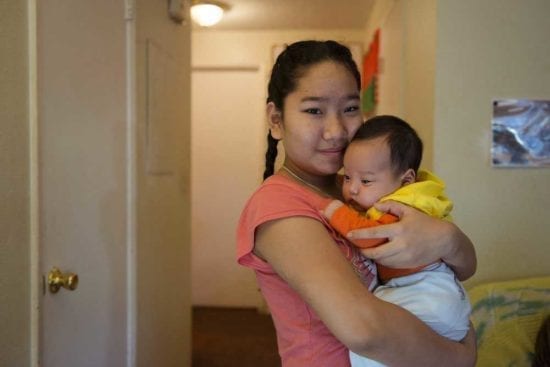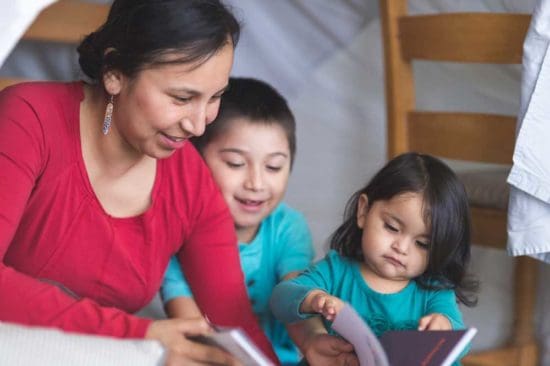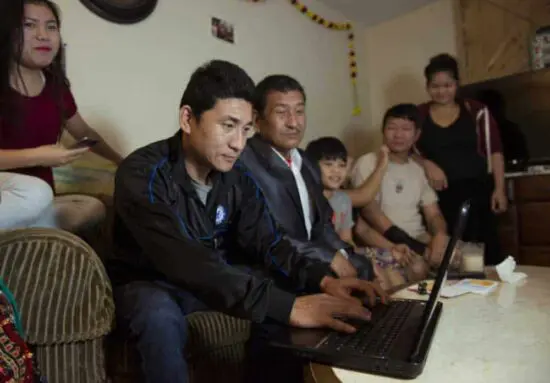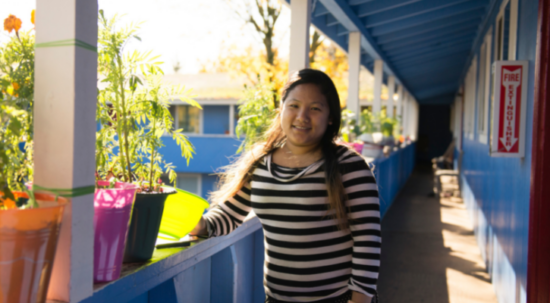Prevwa pou timoun
Paran ak moun k ap bay swen yo responsab legalman pou bay timoun yo jiskaske yo vin granmoun. Nan pifò eta yo, timoun yo vin granmoun legalman a laj 18 an.
Paran yo responsab pou reponn a bezwen debaz pitit yo, ki gen ladan:
- Manje, rad ak lojman
- Swen sante fizik ak mantal
- Edikasyon piblik oswa prive
- Sipò finansye
- Sipèvizyon
- Pwoteksyon
Tou de paran yo oblije sipòte pitit yo kèlkeswa estati matrimonial. Paran ki divòse yo ka oblije peye yon pansyon alimantè an fonksyon de paran ki gen gad timoun nan.
| Si w gen difikilte pou pran swen pitit ou, gen òganizasyon ki ka ede w peye pou depans de tou lè epi jwenn gadri pou timoun. |
Abi ak neglijans
Tout eta yo gen lwa ki pwoteje timoun yo sòti nan kat kalite prensipal maltretman.
- Abi fizik se nenpòt zak ki lakòz yon blesi fizik grav, tankou frape, kout pwen, kout pye, ak voye jete.
- Abi emosyonèl se nenpòt zak ki lakòz domaj emosyonèl, tankou joure, di betiz, fè blag sou moun, fè moun wont, ak menas.
- Abi seksyèl se nenpòt aktivite seksyèl fòse, manyen ki pa apwopriye, oswa montre foto oswa videyo ki pa apwopriye
- Neglijans se echèk pou bay nesesite debaz yo, tankou manje, lojman, swen medikal, edikasyon, ak sipèvizyon
yo kapab akize Paran ki gen pwoblèm dwòg yo pou abi sou timoun ak neglijans nan kèk sitiyasyon. Ekspoze timoun yo nan aktivite dwòg ilegal se yon krim tou nan anpil eta.
Chak eta legalman mande pou sèten moun pou rapòte abi oswa neglije lapolis ak ajans byennèt timoun. Sa a posib si yo konnen oswa sispèk li. Repòtè obligatwa sa yo gen ladan travayè sosyal, founisè swen sante, pwofesyonèl sante mantal, pwofesè, anplwaye lekòl la, founisè swen pou timoun, ak ofisye ki fè respekte lalwa. 18 eta yo mande pou tout moun rapòte abi ak neglijans timoun yo.
| Si w konnen yon timoun k ap sibi abi, kontakte sèvis pwoteksyon timoun lokal yo, Childhelp National Child Abuse Hotline, oswa National Center for Missing and Exploited Children. Rele 911 si yo an danje imedya ak danje grav. Nan pifò eta yo, ou ka rapòte abi timoun anoniman Yo p ap pataje idantite w ak moun ki sispèk abizè a. |
Lapolis ak sèvis pwoteksyon pou timoun (CPS) revize rapò sou abi ak neglijans sou timoun. CPS ka deside mennen ankèt sou sitiyasyon grav lè li pale ak timoun nan, fanmi, temwen, ak repòtè yo. CPS ap deside si wi ou non yo dwe entèvni pou asire yo ke pitit la ak fanmi an sekirite. Nenpòt entèvansyon CPS pral nan pi bon enterè timoun nan.
Nan anpil ka, CPS ap mande pou paran an rankontre ak yon travayè sosyal pou pale sou enkyetid sekirite. Travayè sosyal la ka ede paran an idantifye fason pou bay timoun nan sekirite lakay li.
Nan kèk ka, CPS ka retire timoun nan nan men paran yo si yo an danje. Paran an dwe montre kouman yo ka pran swen pitit yo nan yon anviwònman ki an sekirite anvan CPS voye pitit yo tounen lakay li. Nan ka ekstrèm abi timoun, CPS ka mande yon tribinal mete fen nan dwa paran yo.
Disiplin gen entansyon pou anseye timoun yo kijan pou yo konpòte yo byen. Abi timoun yo se yon zak ki gen entansyon fè timoun yo mal. Fòm abi timoun gen ladan mal fizik, emosyonèl, ak seksyèl, ak neglijans. Disiplin ka vire nan abi sou timoun lè yo itilize yo pou pini ak fè mal timoun yo pou move konpòtman.
Kite yon timoun lakay pou kont li
Anpil lwa eta yo konsidere kite yon timoun ki pa sipèvize kòm neglijans espesyalman lè fè yo mal oswa mete yo danje. Malgre ke, pifò eta yo pa gen lwa ki idantifye yon laj minimòm pou kite yon timoun lakay li poukont li.
Li enpòtan pou reflechi sou bezwen pitit ou a, laj, sante fizik, ak byennèt emosyonèl anvan ou deside kite yo nan kay la pou kont li. Ou ta dwe konsidere tou kantite tan ou pral absan ak anviwònman familyal kote w pral kite pitit ou.
| Si ou menm oswa pitit ou a pa santi w an sekirite lè w kite lakay ou poukont ou, konsidere opsyon gadri yo. |
Lekòl
Si w se yon paran yon timoun ki gen laj lekòl, ou gen diferan kondisyon ak dwa.
Paran yo legalman oblije pou yo gen pitit yo ale nan lekòl la. Sa ka gen ladan lekòl piblik oswa prive kòm byen ke pwogram lekòl lakay yo. Lwa leta yo varye sou ki laj timoun yo oblije kòmanse lekòl ak lè yo lage. Paran yo oblije asire w pitit yo ale nan lekòl regilyèman epi swiv règleman kondwit lekòl la.
Paran yo gen dwa mande chanjman nan klas lekòl pitit yo ak aktivite ki baze sou bezwen pitit yo. Paran yo ka chwazi patisipe nan kèk klas ak tès estanda. Lekòl yo dwe fè akomodasyon rezonab pou asire ke kèk moun gen opòtinite egal pou yo reyisi nan lekòl la. Sa gen ladan elèv ki gen ladrès pou lang diferan, andikap, relijyon ak idantite sèks.
Paran yo gen dwa pou yo mande èd ak sekirite pitit yo nan lekòl la. Lekòl yo dwe di paran yo si pitit yo viktim entimidasyon oswa ap entimide lòt elèv yo. Paran yo kapab tou rapòte entimidasyon ak diskriminasyon bay anplwaye lekòl la. Lekòl yo dwe reponn rapò sa yo epi fè efò pou amelyore sekirite elèv yo.
| Aprann plis enfòmasyon sou voye pitit ou nan lekò Etazini. |
Lòt lwa enpòtan
Paran yo responsab pou sipèvize chofè adolesan sitou lè yo gen yon pèmi pou aprann.
Paran yo pa ka fòse pitit yo marye kont volonte yo. Sepandan, paran yo ka pèmèt pitit yo marye nan laj 16-17 an si lalwa leta mande pèmisyon paran yo pou moun ki poko 18.
Konsèy sou elve timoun ki nouvo nan Etazini a
Pou w yon paran se pa toujou fasil. Li kapab espesyalman difisil pou fanmi yo ki ap adapte ak yon nouvo peyi. Paran ak timoun imigran yo fè fas a anpil defi inik.
Pale ak pitit ou sou santiman ou ak eksperyans adaptasyon w ak kilti Ameriken an. Li oke si pitit ou sanble adapte pi vit nan kilti Ameriken pase w. Pale sou fason ou tou de ka vin patisipe nan kominote lokal ou ansanm. Pratike aprann Anglè ak pitit ou epi patisipe nan aktivite kominote yo ansanm.
Ofri pitit ou opòtinite pou rete konekte ak kilti w. Fè konvèsasyon nan lang natif natal ou. Li liv epi gade fim nan lang natif natal ou. Kwit resèt tradisyonèl yo ansanm. Pataje tradisyon ou pi renmen nan peyi lakay ou. Antre nan gwoup kominotè pou moun ki sòti nan peyi lakay ou.
Kontakte fanmi, zanmi, ak pwofesyonèl pou jwenn sipò. Si w gen pwoblèm ak pitit ou, li ka bon pou w jwenn èd. Pale ak pitit ou, manm fanmi w, zanmi w, ak founisè sèvis pou jwenn solisyon ki travay. Aprann sou jwenn sèvis sante mantal.
Jwenn èd
Jwenn plis resous pou paran ak adolesan ki nouvo Etazini.
Resous | Ofri |
|---|---|
Yon gid pou paran imigran ki leve timoun nan peyi Etazini an Anglè, Arab, Panyòl, Nepali, ak Somalyen. | |
Resous lokal pou gadri timoun, sante, ak sèvis sosyal, ak asistans finansye pou chak eta | |
Resous pou fanmi imigran ak refijye yo | |
Gid pou kreye yon plan ijans fanmilyal ak parantal | |
Sipò emosyonèl nan telefòn ak resous paran sou entènèt | |
Sipò emosyonèl pou adolesan kap chèche èd ak resous sou entènèt pou adolesan, paran, ak moun kap bay swen | |
Resous kominotè lokal yo, tankou kriz ak ijans, manje, lojman, ak sante |
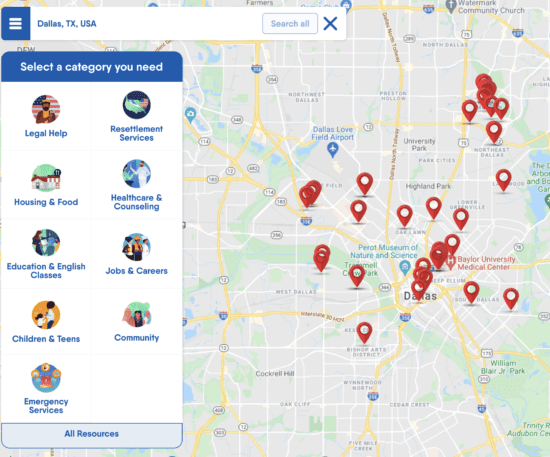
Jwenn èd legal, klas Anglè, klinik sante, sipò lojman, ak plis ankò. Chèche yon kat jeyografik lokal ak lis sèvis pou imigran nan Etazini a ak aplikasyon FindHello a.
Enfòmasyon ki nan paj sa a vini de USA.gov, the U.S. Department of Health & Human Services, ak lòt sous nou ka fè konfyans. Objektif nou se pou ofri enfòmasyon ki fasil pou konprann epi yo mete yo ajou regilyèman. Enfòmasyon sa yo pa konsèy jiridik.
